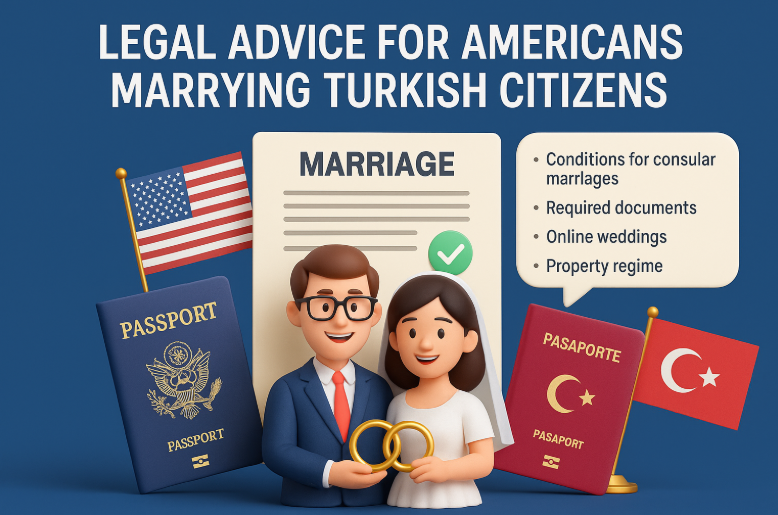Marriage between American and Turkish citizens is a beautiful union of cultures, but it also requires navigating the legal systems of two different countries. Whether the marriage takes place in the United States, in Turkey, or at a Turkish consulate abroad, there are essential legal steps and considerations you should be aware of. This article outlines the key legal requirements and procedures Americans should follow when marrying a Turkish citizen.

Where Can You Get Married?
Americans and Turkish citizens can get married:
- In Turkey, before a Turkish civil authority (marriage officer).
- In the United States, under state law.
- At a Turkish consulate abroad, under specific conditions.
It is important to remember that only civil marriages are legally recognized in Turkey. Religious ceremonies alone do not create a valid marriage under Turkish law.

What Documents Do You Need for Marriage in Turkey?
To get married in Turkey, both parties must provide the following documents:
- Passport and Valid ID
- Birth Certificate
- Certificate of No Impediment to Marriage
- Americans must obtain this document from the U.S. Embassy or Consulate in Turkey.
- Health Report
- A blood test and medical examination from a state hospital in Turkey are required.
- Residency Certificate (in some municipalities)
All foreign documents must be translated into Turkish and notarized. In many cases, they also need to be apostilled to be legally recognized in Turkey.

What Is the Legal Age and Consent Requirement?
Under Turkish law, the minimum age for marriage is 18. However:
- 17-year-olds may marry with parental consent.
- 16-year-olds may marry with a court decision in exceptional cases.
Both parties must give their free and full consent to the marriage.

Can You Marry via Proxy or Online?
No. Proxy marriage and online marriage are not valid under Turkish law. Both partners must be physically present and personally declare their intent to marry before the marriage officer.

Which Law Applies to Marriage Eligibility?
According to Article 13/1 of the Turkish International Private and Procedural Law (MÖHUK):
- Each person’s national law governs their eligibility to marry.
- For Americans, U.S. state law will determine whether they meet the legal requirements to marry.
- For Turkish citizens, Turkish law will apply.
If either party lacks the legal capacity to marry under their national law, the marriage may be deemed invalid—even if allowed by the other country’s laws.

What Happens After the Marriage? Recognition and Validity
If the marriage takes place in Turkey:
- It must be registered with Turkish civil authorities.
- American citizens may optionally register the marriage with U.S. authorities, depending on state-specific rules.
If the marriage takes place in the U.S.:
- The Turkish spouse should register the marriage with the Turkish consulate to ensure recognition in Turkey.

Do You Need a Prenuptial Agreement?
In Turkey, the default marital property regime is “participation in acquired property”. However, couples can choose a different property regime (e.g., separation of property) by agreement.
If you want to make a prenuptial agreement, it must:
- Be in writing
- Be notarized before the marriage
- Follow both U.S. and Turkish legal formalities (depending on where you intend the agreement to be enforceable)

Conclusion
International marriages bring legal complexity, especially when different legal systems are involved. Americans planning to marry Turkish citizens should:
- Understand both Turkish and U.S. requirements,
- Prepare all necessary documents in advance,
- And consider legal counsel if needed for issues like prenuptial agreements or property rights.
A legally sound start to your marriage will help you avoid future complications—so love boldly, but marry wisely.

Yanıt yok